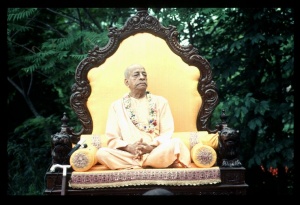SB 9.20.23: Difference between revisions
m (1 revision(s)) |
(Vanibot #0054 edit - transform synonyms into clickable links, which search similar occurrences) |
||
| (One intermediate revision by one other user not shown) | |||
| Line 1: | Line 1: | ||
{{info | {{info | ||
|speaker= | |speaker=Śukadeva Gosvāmī | ||
|listener=King | |listener=King Parīkṣit | ||
}} | }} | ||
[[Category:Srimad-Bhagavatam - Canto 09 Chapter 20]] | |||
[[Category:Bhagavatam Verses Spoken by Sukadeva Gosvami - Vanisource|092023]] | |||
<div style="float:left">'''[[Srimad-Bhagavatam]] - [[SB 9|Ninth Canto]] - [[SB 9|Ninth Canto]] - [[SB 9.20: The Dynasty of Puru|Chapter 20: The Dynasty of Pūru]]'''</div> | |||
<div style="float:right">[[File:Go-previous.png|link=SB 9.20.22]] '''[[SB 9.20.22]] - [[SB 9.20.24-26]]''' [[File:Go-next.png|link=SB 9.20.24-26]]</div> | |||
{{RandomImage}} | |||
==== TEXT 23 ==== | ==== TEXT 23 ==== | ||
<div | <div class="verse"> | ||
pitary uparate so 'pi | :pitary uparate so 'pi | ||
cakravartī mahā-yaśāḥ | :cakravartī mahā-yaśāḥ | ||
mahimā gīyate tasya | :mahimā gīyate tasya | ||
harer aṁśa-bhuvo bhuvi | :harer aṁśa-bhuvo bhuvi | ||
</div> | </div> | ||
| Line 17: | Line 22: | ||
==== SYNONYMS ==== | ==== SYNONYMS ==== | ||
<div | <div class="synonyms"> | ||
''[//vanipedia.org/wiki/Special:VaniSearch?s=pitari&tab=syno_o&ds=1 pitari]'' — after his father; ''[//vanipedia.org/wiki/Special:VaniSearch?s=uparate&tab=syno_o&ds=1 uparate]'' — passed away; ''[//vanipedia.org/wiki/Special:VaniSearch?s=saḥ&tab=syno_o&ds=1 saḥ]'' — the King's son; ''[//vanipedia.org/wiki/Special:VaniSearch?s=api&tab=syno_o&ds=1 api]'' — also; ''[//vanipedia.org/wiki/Special:VaniSearch?s=cakravartī&tab=syno_o&ds=1 cakravartī]'' — the emperor; ''[//vanipedia.org/wiki/Special:VaniSearch?s=mahā&tab=syno_o&ds=1 mahā]-[//vanipedia.org/wiki/Special:VaniSearch?s=yaśāḥ&tab=syno_o&ds=1 yaśāḥ]'' — very famous; ''[//vanipedia.org/wiki/Special:VaniSearch?s=mahimā&tab=syno_o&ds=1 mahimā]'' — glories; ''[//vanipedia.org/wiki/Special:VaniSearch?s=gīyate&tab=syno_o&ds=1 gīyate]'' — are glorified; ''[//vanipedia.org/wiki/Special:VaniSearch?s=tasya&tab=syno_o&ds=1 tasya]'' — his; ''[//vanipedia.org/wiki/Special:VaniSearch?s=hareḥ&tab=syno_o&ds=1 hareḥ]'' — of the Supreme Personality of Godhead; ''[//vanipedia.org/wiki/Special:VaniSearch?s=aṁśa&tab=syno_o&ds=1 aṁśa]-[//vanipedia.org/wiki/Special:VaniSearch?s=bhuvaḥ&tab=syno_o&ds=1 bhuvaḥ]'' — a partial representation; ''[//vanipedia.org/wiki/Special:VaniSearch?s=bhuvi&tab=syno_o&ds=1 bhuvi]'' — upon this earth. | |||
</div> | </div> | ||
| Line 24: | Line 29: | ||
==== TRANSLATION ==== | ==== TRANSLATION ==== | ||
<div | <div class="translation"> | ||
Śukadeva Gosvāmī said: When Mahārāja Duṣmanta passed away from this earth, his son became the emperor of the world, the proprietor of the seven islands. He is referred to as a partial representation of the Supreme Personality of Godhead in this world. | Śukadeva Gosvāmī said: When Mahārāja Duṣmanta passed away from this earth, his son became the emperor of the world, the proprietor of the seven islands. He is referred to as a partial representation of the Supreme Personality of Godhead in this world. | ||
</div> | </div> | ||
| Line 31: | Line 36: | ||
==== PURPORT ==== | ==== PURPORT ==== | ||
<div | <div class="purport"> | ||
In Bhagavad-gītā ([[BG 10.41]]) it is said: | In [[Bhagavad-gita As It Is (1972)|''Bhagavad-gītā'']] ([[BG 10.41 (1972)|BG 10.41]]) it is said: | ||
:yad yad vibhūtimat sattvaṁ | :''yad yad vibhūtimat sattvaṁ'' | ||
:śrīmad ūrjitam eva vā | :''śrīmad ūrjitam eva vā'' | ||
:tat tad evāvagaccha tvaṁ | :''tat tad evāvagaccha tvaṁ'' | ||
:mama tejo 'ṁśa-sambhavam | :''mama tejo 'ṁśa-sambhavam'' | ||
Anyone extraordinarily powerful must be considered a partial representation of the opulence of the Supreme Godhead. Therefore when the son of Mahārāja Duṣmanta became the emperor of the entire world, he was celebrated in this way. | Anyone extraordinarily powerful must be considered a partial representation of the opulence of the Supreme Godhead. Therefore when the son of Mahārāja Duṣmanta became the emperor of the entire world, he was celebrated in this way. | ||
</div> | </div> | ||
__NOTOC__ | |||
<div style="float:right; clear:both;">[[File:Go-previous.png|link=SB 9.20.22]] '''[[SB 9.20.22]] - [[SB 9.20.24-26]]''' [[File:Go-next.png|link=SB 9.20.24-26]]</div> | |||
__NOTOC__ | |||
__NOEDITSECTION__ | |||
Latest revision as of 23:51, 18 February 2024

A.C. Bhaktivedanta Swami Prabhupada
TEXT 23
- pitary uparate so 'pi
- cakravartī mahā-yaśāḥ
- mahimā gīyate tasya
- harer aṁśa-bhuvo bhuvi
SYNONYMS
pitari — after his father; uparate — passed away; saḥ — the King's son; api — also; cakravartī — the emperor; mahā-yaśāḥ — very famous; mahimā — glories; gīyate — are glorified; tasya — his; hareḥ — of the Supreme Personality of Godhead; aṁśa-bhuvaḥ — a partial representation; bhuvi — upon this earth.
TRANSLATION
Śukadeva Gosvāmī said: When Mahārāja Duṣmanta passed away from this earth, his son became the emperor of the world, the proprietor of the seven islands. He is referred to as a partial representation of the Supreme Personality of Godhead in this world.
PURPORT
In Bhagavad-gītā (BG 10.41) it is said:
- yad yad vibhūtimat sattvaṁ
- śrīmad ūrjitam eva vā
- tat tad evāvagaccha tvaṁ
- mama tejo 'ṁśa-sambhavam
Anyone extraordinarily powerful must be considered a partial representation of the opulence of the Supreme Godhead. Therefore when the son of Mahārāja Duṣmanta became the emperor of the entire world, he was celebrated in this way.